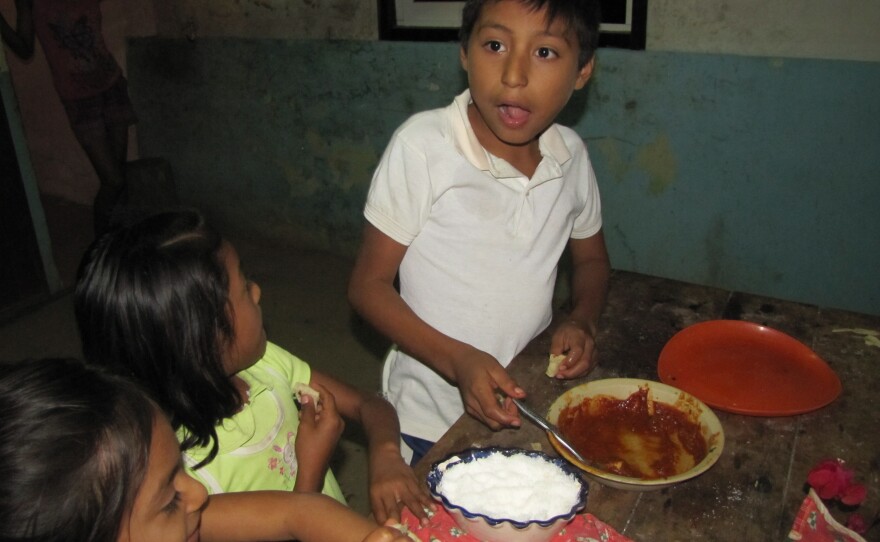
SANTA MARIA HUATULCO, Oaxaca, Mex. -- Millions of undocumented migrants live a shadow existence in the United States. But it may come as a surprise that south of the border, Mexico has a shadow population of its own. It's made up of Mexicans who lack a formal birth certificate and are technically invisible in their own country. They can't vote, get a school diploma or practice a profession.
Octavio Martinez lives in southern Mexico, where this problem is at its worst. Martinez is a community organizer who's easily recognized in his hometown of Santa Maria Huatulco. The modest mid-size city in the state of Oaxaca is less than an hour away from the emerald bays of Mexico's southern Pacific coast.
Tourism in this region means employment, particularly for the poorest job seekers in nearby mountain communities. But some won’t be hired in places like hotels and restaurants because they have no documents establishing their legal identity. Martinez is known as the man who brings these people back from oblivion.
On a recent afternoon he rides in a battered old minivan with no air conditioning. Martinez doesn't drive himself because he’s paralyzed from the waist down. Six years ago, when he was working in law enforcement, a group of criminals shot at his car. A bullet struck his spinal cord and forever changed his life. Now he gets around in a wheelchair. He's also built a generous network of friends from taxi drivers to attorneys who are quick to lend a hand.
A young woman signals to Martinez from the sidewalk. She wears a torn tank top and grasps the hand of a toddler by her side.
"You're the one that does the civil registries, right?" she asks. Her husband needs to get his paperwork in order. She asks how much it costs and they agree to meet over the weekend.
Mexico's National Registry estimates that seven million to nine million Mexicans are without a proper birth certificate. Unlike the United States, babies aren't automatically registered at birth. Mexican parents must take their newborns to the local civil registry office. Those who don't typically live in Mexico's rural or indigenous regions or are extremely poor.
Karen Mercado is the president of the Be Foundation, a nonprofit based in Mexico City that is dedicated to eradicating this problem.
"At lot of these people, they don't understand the importance of having a birth certificate until they have to get their children to school," she said. "By then the children are five or six years old and they have to pay fees. People who live on less than $5 a day. They tell us, 'Look, a birth certificate is a luxury to us.'"

These are the people Octavio Martinez works with almost daily in Oaxaca. It's one of the states with the highest number of unregistered Mexicans. To help offset the problem, the state government sponsors a month-long program once a year where people of any age can register for free.
But it’s not enough. On his own, Martinez registers hundreds of people year-round. In the 15 years he's been a community organizer he estimates he's helped some 10,000 people. The city acknowledges the importance of his work by paying him a $275 stipend twice a month. Most of it goes to paying expenses. Martinez and his wife mostly live off a convenience store they run from home.
On a recent family visit, Martinez traveled 20 minutes out of town on a rugged dirt road. The woman he met needed to get her boy registered. He's 9 years old and can’t get credit for school.
"We now know that registering your child is important," his mother said. "Without a birth certificate it's like they don't exist."
Undocumented Mexicans are sentenced to a life with little promise. Not only are they deprived of an education and a formal job -- they can't open a bank account, get legally married or register their own children. Even worse, they are often targeted by organized crime, either as a victim or a recruit. Not having a formal identity makes it extremely hard for police to track them down.
The problem of under-registration isn’t exclusive to rural regions. Mexico's invisible citizens roam even in the urban jungles of its sprawling capital city.
Brijida Mata Luna is one example. She's spent half her life selling dried chile and garlic off a noisy sidewalk in Mexico City. She guesses she's around 80 years old. She's not certain because she's never celebrated her own birthday. She doesn't know her date of birth because she doesn't have birth certificate or any sort of identification documents.

Just recently a church group helped Mata Luna get registered. But this late in life, the most she'll benefit from it is by getting government welfare. Also when she dies, she'll won't end up nameless in a pauper's grave.
"I'm glad to have my papers," she said. "Before I lived like an animal. Now I live like an actual person."
The Be Foundation is currently lobbying the federal government to make the right to an identity a constitutional right. They argue that change will force states to get serious about registering their residents. The organization is currently self-funded by its eight members and has only managed to get strong support from two of Mexico's 31 states.
Currently the Be Foundation is touring major cities in the United States. Mexico's undocumented citizens also migrate north, where their situation only gets more complex.
"They are not only non-citizens of the United States but they are also non-citizens in Mexico," said Mercado. "They're doubly invisible, doubly undocumented. They can't get any consular protection or any documents, because they have no country."
The Be Foundation is currently seeking grant money to continue their work.






